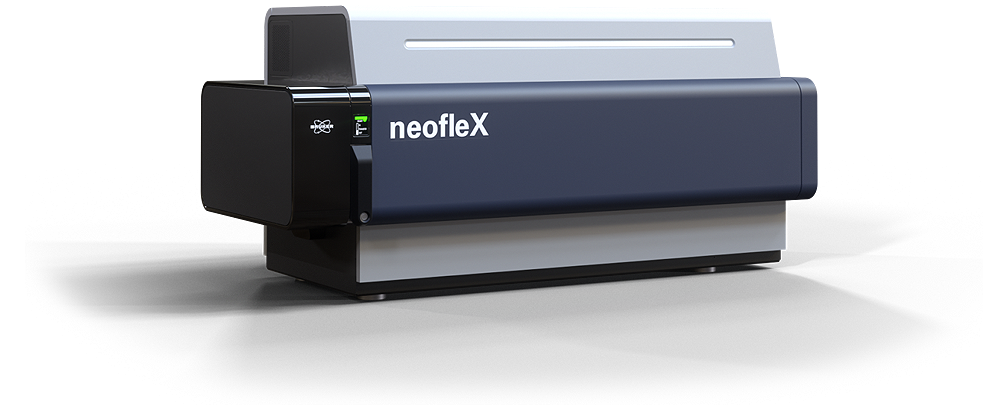Bruker GlycoTyper and GlycoTyper Pharma
High-throughput glycoprofiling in biotherapeutic lead selection.
Glycoproteomics at Scale
HT Glycoproteomics


Targeted glycoprofiling for R&D and biotherapeutic compound screening
GlycoTyper
GlycoTyper is the solution for customized high-volume glycosylation profiling of targeted glycoproteins. The platform is based on isolation of the glycoprotein of interest from biospecimens (body fluids or tissue/cell lysates) using a cognate affinity reagent conjugated to magnetic microparticles in a capture step. Following washes to remove all components of the sample that are not of interest, the captured glycoprotein is released from the magnetic beads, which are then removed from the reaction mixture. In the next step, a PNGase F digest is carried out which releases the N-glycans from the cognate glycoprotein.
In a subsequent step, protein and glycans are separated and glycans are selectively spotted on to a MALDI carrier surface, the Bruker AnchorChip™ in a 384-microarray format. After application of matrix chemistry, the AnchorChip is then processed on either a timsTOF fleX or a neofleX™ instrument for N-glycan data acquisition. Data processing is subsequently carried out using Bruker's proprietary GlycoProcessor software package. While this approach does not capture information on glycosylation macroheterogeneity, it accurately and sensitively (with a lower limit of linearity ≈100 pM) reflects the target protein’s glycan microheterogeneity. The GlycoTyper platform is highly flexible and customizable according to the user’s specific glycoprotein(s) of interest, with all sample preparation and processing carried out by a dedicated, Bruker-provided liquid handling automation device.
GlycoTyper Pharma
GlycoTyper Pharma is a streamlined version of GlycoTyper specifically designed to support the process of lead development and selection during screening and selection of biopharmaceutical drug development candidate molecules. It has become clear that glycosylation of therapeutic antibodies and other biologicals can dramatically affect all aspects of a biotherapeutic’s performance including efficacy, safety/ toxicity and pharmacokinetics and dynamics. Glycosylation status is an essential characteristic of every biotherapeutic molecule and as such closely linked to a drug’s regulatory approval.
Currently, consideration of candidate molecules' glycosylation attributes is commonly only added to the lead selection/optimization process at a relatively late stage due to the time requirements of the LCMS-based approaches that are customarily used in this context. With GlycoTyper Pharma’s high throughput of 5,000 and more candidate molecules per day, we provide a platform that allows including consideration of glycosylation status at an early time point in the lead selection process, thus avoiding unwittingly deselection of molecules with favorable glycosylation attributes as well as the need downstream for expensive and time consuming post-hoc glycoengineering of such features.
GlycoTyper: Making large clinical glycomics studies possible
Processing large sets of samples for glycoproteomic characterization using LCMS approaches has been challenging because of cost and time constraints. The GlycoTyper platform now offers a novel opportunity to carry out studies of any size at scale and in reasonable time frames.
GlycoTyper Pharma for biotherapeutic glycoprofiling
Despite its recognized impact on all aspects of biotherapeutic molecule performance glycosylation has customarily not been considered until the later stages of lead selection due to the time requirements and complexities of the LCMS approaches used customarily so far. Application of GlycoTyper Pharma now offers the opportunity of moving consideration of glycosylation status as an additional criterion for lead selection to a much earlier stage.
GlycoTyper: Application to a clinical unmet need
As an example for the utility of N-Glycan profiling in discovering new biomarkers, a cohort of patients with indolent systemic lupus erythematosus and a matched group of patients with lupus nephritis underwent N-Glycan profiling of spot urine IgG. Some 25 statistically differentially abundant the glycans were found among the two groups providing the creation of a classifier that performed with an AUC of 0.89, and a sensitivity of 90% and a specificity of 91%. This represents the first potentially actionable biomarker for prediction of risk for kidney involvement in patients with SLE.
GlycoTyper Pharma: Validation on FDA approved therapeutic antibody
The GlycoTyper Pharma workflow was applied to study nivolumab (Opdiuva®, BMS). After PNGase F digestion the expected 3 fucosylated glycans were demonstrated by MALDI. To further demonstrate the accuracy of the platform, the drug was also double digested with PNGase F and fucosydase, which resulted in visualization of the expected 3 defucosylated forms of the nivolumab, each exactly 146 Daltons smaller than the parent molecule (reflecting the MW of fucose).
"GlycoTyper is a powerful new glycobiology analysis platform that for the first time provides us with the tools to rapidly and scalably examine the glycoprofile –and its phenotype-specific variations—of individual glycoproteins of interest, with sufficient sensitivity to recognize and visualize also the lower abundant glycan species. We are looking forward to utilizing the platform as a high-throughput tool for the examination of glycosylation variants as a novel source of clinical biomarkers in large patient cohorts which will provide the necessary statistical power to assess their clinical relevance."
Richard Drake, Ph.D., Professor and SmartState Endowed Chair in Proteomics, Medical University of South Carolina, Charleston, SC, USA
For Research Use Only. Not for use in clinical diagnostic procedures.